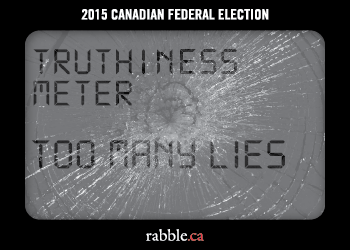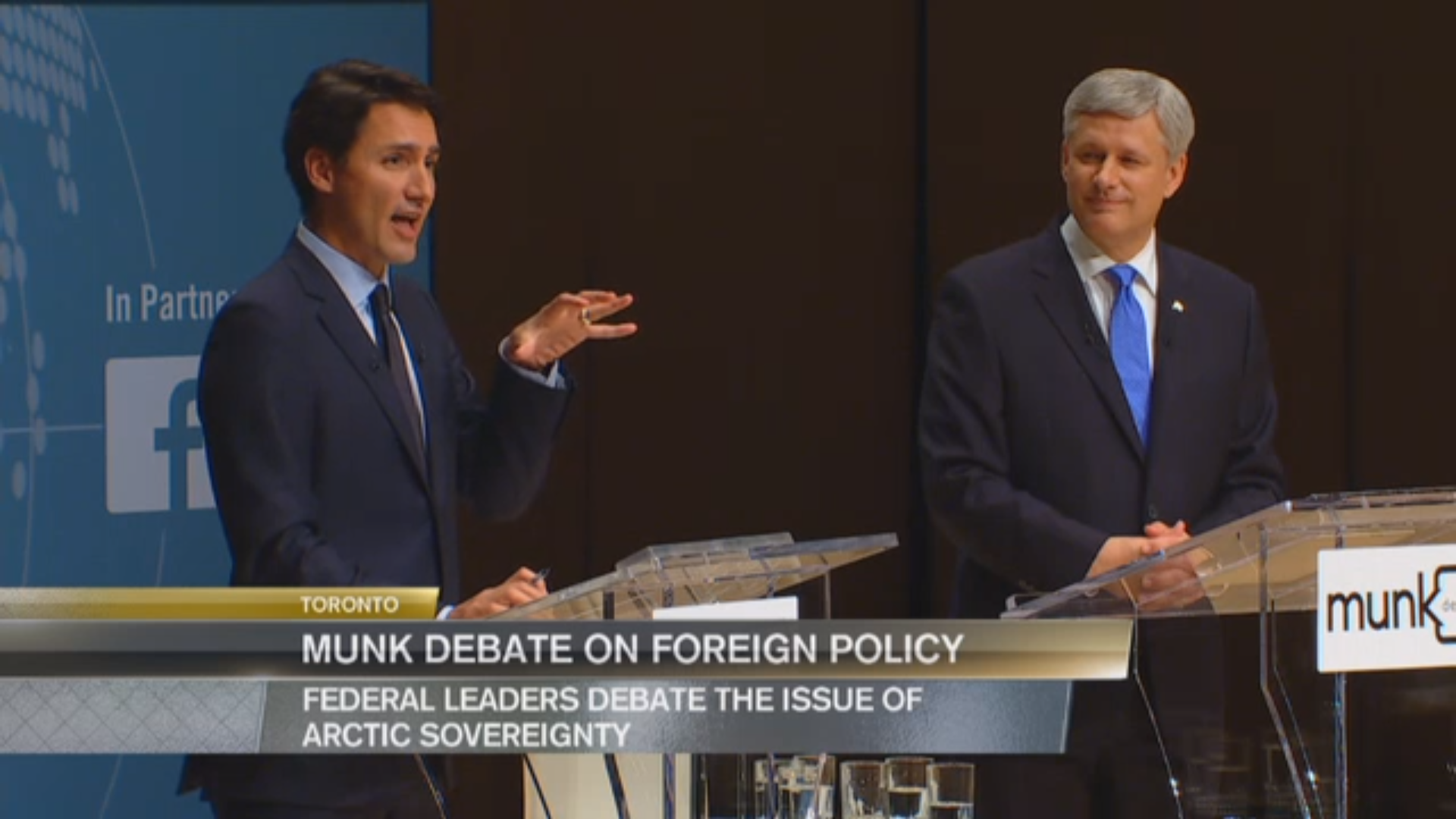Want to see an election campaign fact rich and spin poor? Chip in to keep our fact check blog up to date.
Another week, another debate. This time, the Munk debate was filmed before a live studio audience. This allowed viewers to avoid having the three leaders stare deeply into their souls via the camera. It also provided a laugh track, demonstrating that the loudest among the group were Harper and Trudeau fans.
The event was located at Roy Thompson Hall in downtown Toronto. It’s where Jack Layton’s funeral was held. It’s where a security perimeter was erected during the siege of Toronto in 2010 thanks to the G20. It’s the site of an intense Liberal-NDP race. And, despite being the strongest English-language debate, it’s unlikely to move anything substantial.
But, that didn’t stop the leaders from bringing out their most cherished lines; some that have already been fact-checked by this blog and lines that are begging for a run-through our truthiness meter.
By order of the tallest tales, here’s how Harper, Trudeau and Mulcair fared last night. These nuggets are taken from the first half of the debate, thanks to the Maclean’s transcript.
Stephen Harper
“Not simply because ISIS threatens to slaughter, literally, hundreds of thousands, create millions of additional refugees, but this is an organization that it wants to use parts of Syria and Iraq as an international base for terrorist operations, not just in the region, but also against this country.”
Ok, kind of. ISIS is operating in a region where millions of refugees have been created by other forces. None of the apparently ISIS-inspired attackers in Canada were trained in Syria or Iraq.

“We’ve admitted so far 15 percent of all the world refugees from the region.”
No, no, no. Canada is 41st in the world in how many refugees we accept, and the total doesn’t equal 15 per cent. Fifteen per cent of the immigrants that Canada accepts are refugees, maybe that’s what Harper meant?
Harper is likely referencing UNHCR statistics that track “resettled” refugees (i.e. refugees that file their settlement application in a country different from their country of origin.) In 2013, we resettled 9,160 refugees out of a total group of 93,000. But, with 19.5 million refugees worldwide, nearly 2 million from Syria alone, this statement is completely false.

“And we’re doing so while at the same time making sure that we choose the refugees, that we choose those who are genuine refugees, the most vulnerable people and also maintain all standards of security and other screening.”
Could this line be Harper’s “legitimate rape” moment? He has consistently cast shadows on refugee claimants, saying that many are not genuine. A quick search of the term “genuine refugee” brings up a UKIP article about protecting British culture while also ensuring that the refugees are “genuine.” The term is classic dogwhistle politics being used by right-wing forces across the Western world. Journalists have debunked these kinds of talking points.

“A few blocks — a few blocks from here, [the Toronto 18] would have detonated bombs that would have been on a scale of 9/11.”
Among the Toronto 18, there had been talk of killing innocent people. The RCMP paid $4.1 million to an informant who helped set up the sting operation that landed some of the Toronto 18 in jail. The informant even secured the necessary fertilizer to build bombs.
It was an informant that said that the group was talking about attacking the Toronto Stock Exchange.
Throughout the trial, there was a tug-of-war between the crown that argued that the Toronto 18 were dangerous jihadists and the defense that argued they were a bunch of boys and men who were only talk, with no capacity for action. The truth probably lies somewhere in between, but for Harper to claim that this group had the discussions or capacity to carry out an attack “on a scale of 9/11” is false.
Zakariah Amara, a duel citizen who has lived in Canada since he was a child, and who spent more than 730 days in solitary confinement before he was even convicted, will be the first to have his citizenship taken away from him.

Justin Trudeau
“We think that Canada, as we did very successfully in Afghanistan for many years, as we’ve done in many places around the globe, should be training up the local forces, so they can defeat ISIS on the ground because we know that sending in western troops isn’t always the best possible outcome, and indeed, often makes things worse.”
Trudeau’s claim that Canada’s training efforts were successful isn’t necessarily true. He’s right that sending in forces can make things worse.

“Now, Mr. Mulcair has had three different positions on C-51. His initial position was to change it. Then a few weeks later, it was to repeal parts of it. And then now, it’s to scrap it entirely.”
No, the NDP (and Mulcair) have opposed the legislation consistently, even when public opinion was at +80 per cent in support of C-51.

“Mr. Mulcair, [it] means saying the same thing in French as you say in English.
[…]
In the French debate, you were happy to talk about your decision to — and make it so that separatists could break up this country on a single vote, even though the — the Supreme Court of Canada said no, but you won’t talk about it with Peter Mansbridge in English, you wouldn’t talk about it at the Maclean’s debate.”
No: a Radio-Canada analysis found that Mulcair’s statements about a hypothetical referendum are consistent in both languages. Similar accusations were also launched about Mulcair’s pipeline messaging, which I tackled here.
Trudeau could also be accused of this, as I examined here. His avoidance of the word “austerity” may have signaled a message shift between the two languages. He referenced NDP austerity in Brampton on April 25, but the mentions stopped after the Sept.2 Quebec stop inspired my earlier post.

“But Mr. Mulcair is also playing the politics of fear and division, fear for environmental groups and First Nations, fear that we’re suddenly in a police state, fear that we’ve suddenly ripped up the Charter of Rights and Freedoms.
And we know that that’s not true.”
This was probably the strangest line of argumentation of the evening. The fears conjured by C-51 can’t be attributed to NDP rhetoric. There are legitimate reasons to oppose C-51 and plenty of examples to say that we are living in a police state.
On the contrary, it’s quite true.

Thomas Mulcair
“And on the flow of foreign fighters, never forget that in Mr. Harper’s failed Bill C-51, which was backed by Mr. Trudeau’s Liberals, there was nothing on deradicalization here at home.”
Not quite. C-51 allows law enforcement to closely monitor people who might be radicalized. Harper’s Conservatives believe that C-51 can stand as a deterrent: by seeing other people who have been radicalized thrown in jail or deported, you will immediately cease your radicalization and seek help for deradicalization. Or, be forced to deradicalize as you serve a life sentence.
Last February, Mulcair made the point that this line of reasoning doesn’t work.

Want to see an election campaign fact rich and spin poor? Chip in to keep our fact check blog up to date.



